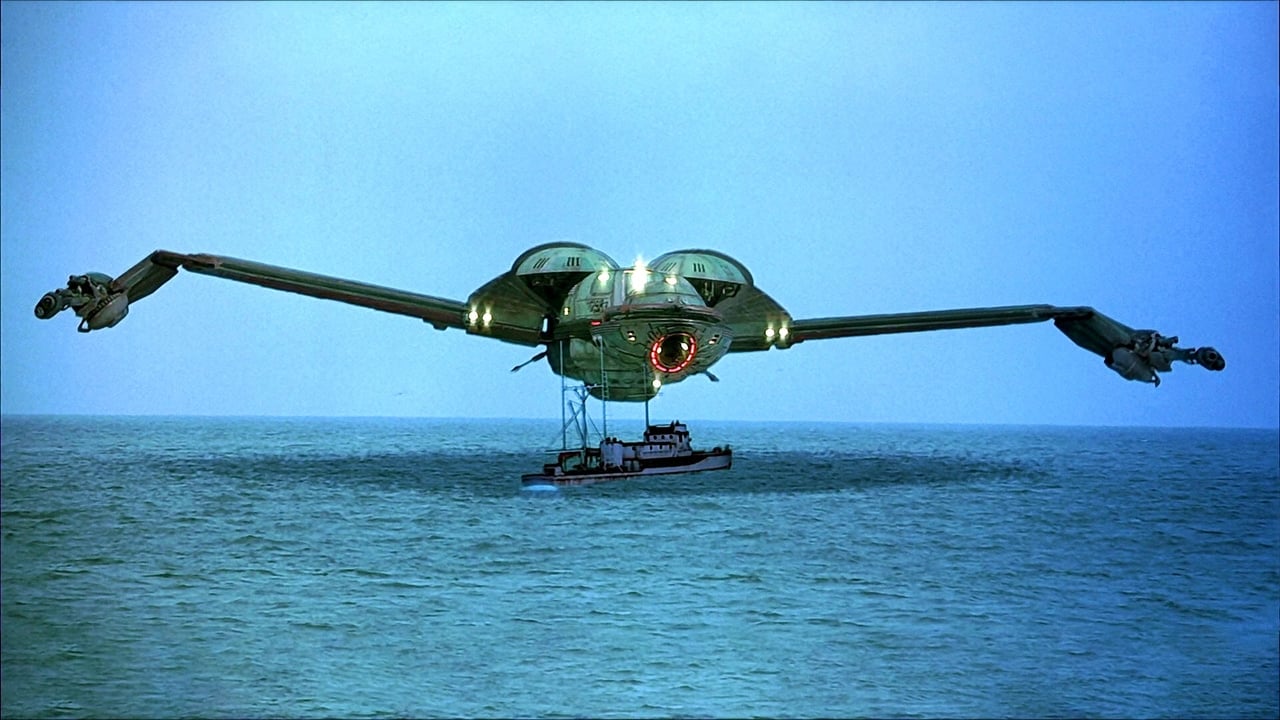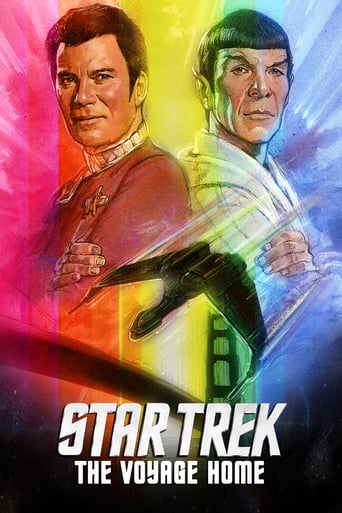Blucher
One of the worst movies I've ever seen
SincereFinest
disgusting, overrated, pointless
Comwayon
A Disappointing Continuation
Glucedee
It's hard to see any effort in the film. There's no comedy to speak of, no real drama and, worst of all.
merelyaninnuendo
Star Trek : The Voyage HomeIt certainly isn't one's usual Star Trek tale, it pushes boundary and offers enough content to keep the audience engaged throughout the course of it. The sequence where the characters visit various places could have been the window for the makers to draw out most of the attention and visit places "where no member has had before". It is lot lighter considering the stakes that are projecting in the franchise usually ends up on the life and death query. It is short on technical aspects like visual effects, sound department and editing but the production design is plausible. Leonard Nimoy's execution has improved a lot but unfortunately that's not saying a lot as it fails to communicate on terms of story-line. The performance is appreciative as usual by the whole cast like William Shartner, Leonard Nimoy and DeForest Kelly. The real gem moments in here are the conversations between Spock and Kirk that should have been explored more by the makers to unsolved the mysterious characteristics of the character. Star Trek : The Voyage Home is an unwelcoming and uncomfortable home on terms of the plot for the characters are the only familiar pieces that helps stabilize the board.
Bill Slocum
This is the hardest Star Trek movie for me to review, so bear with me.On the one hand, it is forced in its social-message earnestness. The apocalyptic set-up takes too long and is rather lame besides. The hug-it-out ending is the kind of thing earnest old Gene Roddenberry might have rejected as too cloying by half.On the other, it's the most enjoyably comic entry in the "Star Trek" canon barring "A Piece Of The Action" and maybe "Galaxy Quest," showcasing some of the best cast chemistry among The Original Series regulars.In short, I find it somewhat tedious on the whole and very entertaining in much of its parts, especially the 65-minute middle section which brings James T. Kirk (William Shatner) and his crew to San Francisco in 1986.I'd rather not waste time setting the film up. The film itself does too much of that, and it only falters in the explanation. Something about a mysterious craft that has the power of shutting down all power in and around the planet Earth. It's sending out unrecognizable lines of communication; Mr. Spock (Leonard Nimoy) recognizes humpback whalesong. Since humpbacks are extinct in the 23rd century, Spock determines the best way to handle this is find some whales in Earth's past that can respond and send the craft back from whence it came.It's a weak device, throwing up a lot of unanswered questions (what became of all those unfortunate crewpeople on ships that we see in the opening drifting powerless into space's vaccuum?) All you are supposed to care about are the usual suspects, Kirk and the gang of the late U. S. S. Enterprise, now aboard a stolen Klingon bird-of- prey. If you can, good for you.Give Nimoy a lot of credit. I don't like the script he helped write, but as director he makes it work by building up his fellow actors from the TV show. Anyone notice how Spock never gets the last word this time in his exchanges with Dr. McCoy (DeForest Kelley)? Instead, he's the butt of much of the humor, as when he strains futilely to inject profanity in his exchanges in order to fit in on 20th-century Earth."He's not exactly working on all thrusters," McCoy reminds Kirk.A silly-looking Spock is not what you expect, but watching him try to drop "hells" and "damns" with unbecoming Vulcan gravity is a joy of repeated viewings.I can do without the save-the-whales message being troweled on like mortar. Kirk's female contact on 20th century Earth has a "I Heart Whales" bumper sticker, and there's a long section showcasing whale slaughter in gory detail. I don't need the violins as I tuck into my whale steak and heat my cottage with blubber oil.Yet "Star Trek" did inject social commentary a lot in its TV period, along with some fairly comic outings. In both cases, "Star Trek IV" serves as a pleasant return to the well, reminding us why it was so enjoyable for so long. Humor comes across to some degree in other outings, but here it becomes more central than usual. Not all the jokes are great, but the delivery is solid. Even Chekov (Walter Koenig) gets some overdue attention as an object of last-minute rescue.Who doesn't get a kick out of watching Kirk and Spock negotiate mass transit? Non-fans will enjoy the digs, while fans who balance their loyalty to the franchise with an appreciation for popular-if-dated entertainment tropes will find this a worthwhile if minor addition to the mythos that is Trek.
pkpera
I watched it again, some 30 years after first time. And liked it even more. No, it is not perfect, could discuss about some plot holes, being not serious and like, but I give it 10. Because it does what one movie should do: entertain, warm up our hearts, and even teaches. For how many of newer movies you can tell the same ? Visual effects are top notch, of course considering when it is made. And acting too. Catherine Hicks was nice surprise, she gave most of soul to the movie, but others too. I'm sure they all liked the story and message. And it is actually Leonard Niroy movie - he directed and he was main story author. Such a great talent ! For the end of this small review I can say this: I will surely watch this again one day. Maybe even more than once - due to sad lack of movies with real story (story what makes sense), soul (and not some superpower boredom) this days. I watched this in one breath, what could not say for latest Star Trek movie at all.
speedy-droid
The Voyage Home (TVH) is indeed the last Star Trek movie to follow the original, traditional goal verbally stated by Gene Roddenberry back in the 1960s... To address current social and political issues using a fictional universe as a metaphor. Roddenberry wasn't specifically trying to create what most folks consider to be science fiction, he wanted to address issues like race in a way that people would understand, but that would also make it past the censors. For example, there was no way, in the 1960s, that NBC would have aired a prime- time TV show about Black/White racial strife, but they did air a Star Trek episode about people with half-black, half-white faces who hated each other so much that they genocided each other (Let That Be Your Last Battlefield). Why did they hate each other so much? Some were white on the right side and black on the left side, and the others were the opposite. Nichelle Nichols confirmed this in a TV interview when she recounted a meeting with Roddenberry and told him, "You're making morality plays." Roddenberry responded, "Shhh... Don't tell anyone."TVH hits this old-school theme right on the button by addressing a modern issue... animal species endangerment and extinction caused by man. The plot is a bit quirky and silly at times, but the core of the story is rock solid. Humans have gotten themselves into a real pickle and now face extinction themselves, all because of their ecological negligence and short-sightedness. There is also an ethical "awakening" when Spock theorizes that Humpback Whales might just be a much older and more advanced species than Humans. That question is never answered, but by the end of the movie it does seem somewhat possible that the whales are, at least in some fashion, ahead of humans on the evolutionary ladder. The whales' "God" certainly isn't afraid to show up and wipe out the whole planet Earth. It's never quite clear if the whale god is only trying to establish contact, or if it's exacting vengeance, or it's a combination of the two. It appears to me that it either doesn't recognize humanity or just completely ignores it, but it is intent upon doing some serious damage to Earth. It's certainly one of the most powerful entities ever seen in the Star Trek Universe... the only entity other than V'Ger to show utter contempt for the Human species, possibly indicating that Humans are nothing more to it than an amoeba is to Humans.The underlying message is that yes, humans do have an impact on the Earth, and their negligence can unintentionally genocide a (possibly sentient) species. In the Star Trek universe, at least, the whales understand the concepts of species and self-awareness to some degree, as Spock mentions that Gracie understood his intentions and was saddened by the treatment of her species by humans.The backstory of the crew's return and Spock's re-discovering of himself keeps the new-age Trekkies interested, which is difficult to do without some phasers and explosions. There's a nice little surprise at the end, resolving an issue that was raised over 15 years prior to the release of TVH, and it totally caught me and most other Trek fans off-guard when we first saw it. That is the resolution between Spock and Sarek, which I honestly believed would never be resolved.For the non-Trekkies, the Spock/Sarek issue is a character study of the Human species. Contrary to popular belief, Vulcans have far more powerful and often violent emotions than humans, which almost led to their self-destruction a long time ago. Vulcans are not without emotion... rather, their emotions are so passionate that they are compelled to control them and become "logical beings" for the primary purpose of preventing them from exterminating themselves. Sarek, a full Vulcan, actually has more difficulty controlling his emotions than Spock, his half-Vulcan, half-Human son. Until this film, Spock was staunchly Vulcan (or wanted to be), while Sarek has been leaving clues all along that he wanted to be an emotional being... more Human. Sarek spent a lot of time on Earth as an ambassador and married a Human female. He opposed Spock's entry into Starfleet, probably because he didn't want Spock to lose control of his Human side, which Sarek feels constant association with Humans will cause. The irony is that Sarek desperately wants his half-Human son to be Vulcan, while he, a full Vulcan, desperately wants to be Human, at least subconsciously.Neither Nimoy nor Lenard is a top-notch actor, but they've been playing (and living) these two characters for a long time, and it comes to a head in this scene near the end of TVH. If Star Trek ever had a scene approaching "fine cinema" quality, this is it. Both Nimoy and Lenard nail the scene, and their characters, perfectly.

